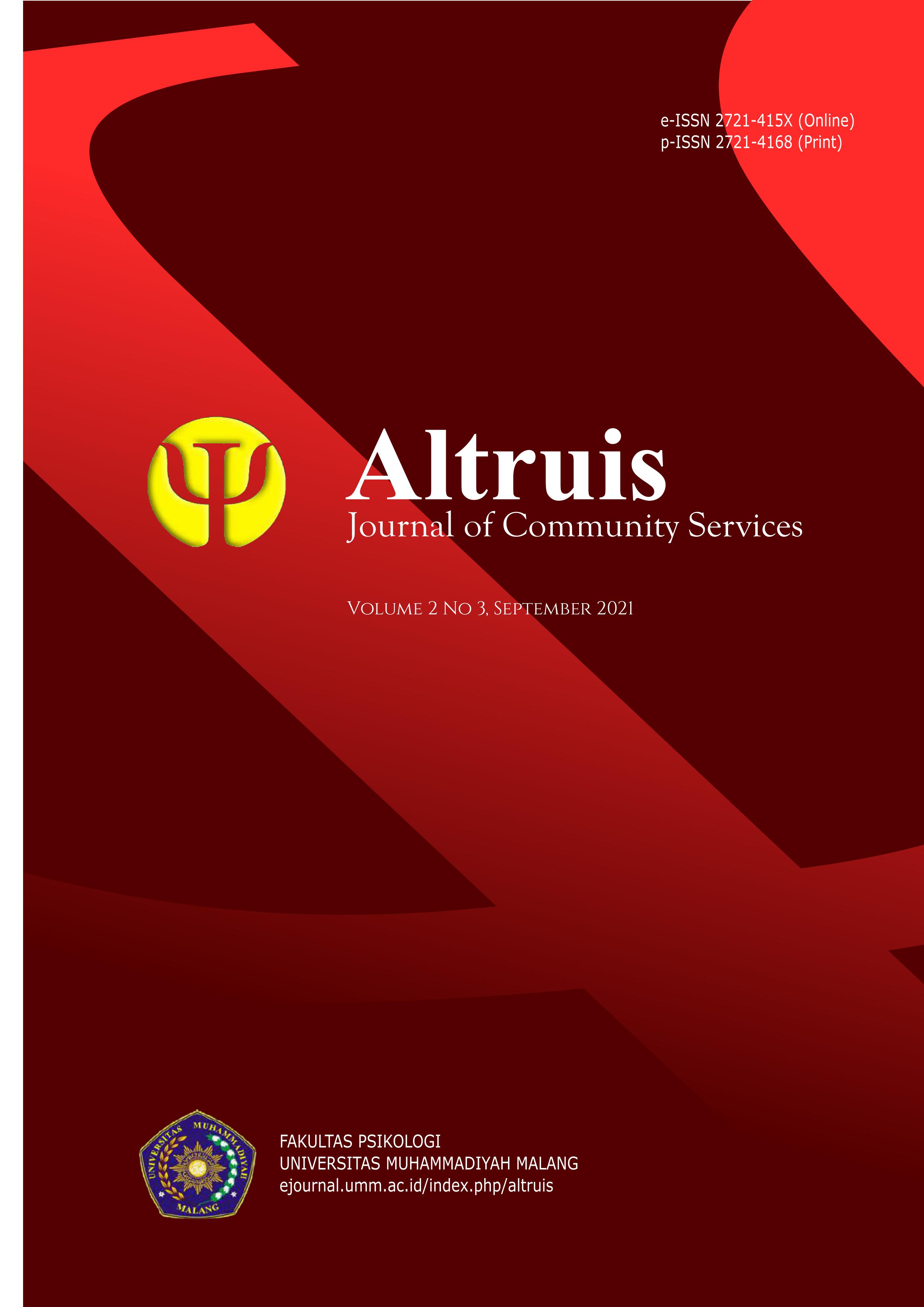Pemanfaatan Aromatherapy Sebagai Alternatif Untuk Menurunkan Tingkat Stress Menghadapi Ujian pada Mahasiswa Universitas Muhammadiyah Kalimantan Timur
DOI:
https://doi.org/10.22219/altruis.v2i3.17872Keywords:
Stres, Penyakit Mental, Motivasi Belajar, Hasil Prestasi Akademik, AromatherapyAbstract
Stres merupakan salah satu penyakit mental yang kini sulit dihindari oleh manusia. Stres bisa berasal dari individu, lingkungan keluarga, lingkungan tempat tinggal, lingkungan kerja bahkan lingkungan pendidikan. Stres di lingkungan pendidikan yang tidak dapat dikelola dengan baik tentu akan memberikan dampak negatif, misalnya menurunnya motivasi belajar, dan menurunnya hasil prestasi akademik. Penelitian terapan ini bertujuan untuk melihat efek intervensi pemberian aromaterapi mampu menurunkan tingkat stres yang dialami oleh mahasiswa di lingkungan pendidikan Universitas Muhammadiyah Kalimantan Timur. Penelitian ini menggunakan metode kuasi eksperimen yang akan memberikan perlakuan atau intervensi terhadap satu kelompok dari dua kelompok penelitian yang ada. Sebelum dan sesudah diberikan perlakuan responden akan diukur tingkat stresnya menggunakan alat tes psikologi Depression Anxiety Stress Scale (DASS) yang diadaptasi oleh peneliti. Hasil diperoleh bahwa intervensi aromaterapi memberikan efek penurunan tingkat stres namun tidak signifikan. Dari Sembilan orang terdapat lima orang yang mengalami penurunan sedangkan empat lainnya tidak ada perubahan. Data pra test dan post test dianalisis dengan cara menjumlahkan total skor aitem DASS dan menggeneralisasikan dengan norma kategori alat tes tersebut.
Downloads
References
Adiesisa. K.P., Rismelina. D., Tazkiyah. A.Y., dkk. (2016). Filosofi dan manfaat batimung dan aromaterapi untuk mengurangi stres. Jurnal Psikostudia Universitas Mulawarman. 5 (1), 1-18.
Ali, B., et al. (2015). Essential oils used in aromatherapy: A systemic review. Asian Pacific Journal of Tropical Biomedicine. 5(8), 601-611
Anggraini. Y.D.S. (2015). Pengaruh aromaterapi lavender terhadap stres mahasiswa tingkat akhir s1 keperawatan kelas B program A. Skripsi. Stikes Muhammadiyah Samarinda.
Ardani, T.A. (2013). Catatan ilmu kedokteran jiwa, 1 st edt. Bandung: CV Karya Putra Darwati.
Bae, I. et al. (2018). Effects of aromatherapu essential oil inhalation on the stress response after exposure to noise and arithmetic subtraction stressor: randomized controlled trial. International Journal Clinical Experiment Medicine. 11(1), 275-284.
Desmita. (2010). Psikologi perkembangan. Bandung: PT. Remaja Rosdakarya.
Ghozali, I. dan Castellan. (2002). Statistik non parametric. Semarang: Badan Penerbit UNDIP.
Goodman, L. S., & Gilman, A. G. (2008). The pharmacological basis of therapeutics. San Diego: The McGraw-Hill Companies.
Haryono, R. (2018). Pengaruh terapi kombinasi aromaterapi lavender dan dzikir terhadap penurunan stres dan tekanan darah pada penderita hipertensi. Jurnal Keperawatan Notokusumo. 6(1), 68–79.
Hutasoid, A.S. (2013). Aromaterapi untuk pemula. Jakarta : PT Gramedia Pustaka Utama.
Karadag, E. et al. (2015). Effects of aromatherapy on sleep quality and anxiety of patients. British Association of Critical Care Nurses. Doi: 10.1111/nicc.12198
Kozier, B., Erb, G., Berman, A., dan Snyder, S.J. (2010). Buku ajar fundamental keperawatan (Alih bahasa : Esty Wahyu ningsih, Devi yulianti, yuyun yuningsih. Dan Ana lusyana ). Jakarta.
Kumari, A., Jain, J. 2014. Examination stress and anxiety: A study of college students. Global Journal of Multidisciplinary Studies. 4(1)
Nurdini, K. (2009). Efektivitas konseling kognitif perilaku untuk mengelola stres akademik siswa sekolah menengah kejuruan. Skripsi. Universitas Pendidikan Indonesia Bandung.
Patel C, Marmot, MG., Terry DJ., Carruther M., Hunt B., Patel M. (1985). Trial of relaxation in reducing coronary risk four years follow-up. Br Med Journal. 290 (6475), 1103-1106.
Rana, A., Gulati, R., Wadhwa, V. (2019). Stress among students: An emerging issue. Integrated Journal of Social Sciences, 6(2), 44-48.
Robbins, Stephen P. dan Coulter, M. (2010). Manajemen edisi kesepuluh. Jakarta: Erlangga.
Sarafino, E.P., Timothy, W. Smith. (2011). Health psychology biopsychosocial interactions seventh edition. USA: John Wiley & Sons.
Shah, Hasan, Malik, Sreeramareddy. (2011). A study on stress and aromatherapy intervention efficacy. Department Chair Health and Human Performance.
Sya’diyah, Hidayatus, Apriliani, Dewi, R. (2015). Pengaruh aromaterapi lavender terhadap penurunan tingkat stress pada lansia di panti werdha anugrah Surabaya. Proceeding of CSW Candle: Emergency Nursing of Status Epolepticus Convulsive and Refractor. Kediri
Sharma. S. (2009). Aroma therapy. Jakarta: Kharisma Publishing Group.
Taylor, D.A. (2006). Social penetration: The development or interpersonal relationship. New York: Holt, Rinehart & Winston.
Widayani, N.K.T., Sutrisno., Riniasih. W. (2016). Pengaruh aromaterapi dupa lavender terhadap penurunan tingkat stres saat penyusunan skripsi pada mahasiswa S1 keperawatan Stikes An Nur Purwodadi. Skripsi. STIKES An Nur Purwodadi.
Yusuf, Syamsu. (2006). Psikologi perkembangan anak dan remaja. Bandung: PT. Remaja Rosdakarya.
Downloads
Published
How to Cite
Issue
Section
License
Copyright (c) 2021 Desita Dyah Damayanti, Diana Putriana, Citra Mutiara Dewi, Almadian Septiana Putri

This work is licensed under a Creative Commons Attribution-ShareAlike 4.0 International License.
Authors who publish in Altruis agree to the following terms:
- For all articles published in Altruis, copyright is retained by the authors. Authors give permission to the publisher to announce the work with conditions. When the manuscript is accepted for publication, the authors agree to automatic transfer of the publishing right to the publisher.
- Authors retain copyright and grant the journal right of first publication with the work simultaneously licensed under a Creative Commons Attribution-ShareAlike 4.0 International License that allows others to share the work with an acknowledgment of the work's authorship and initial publication in this journal.
- Authors are able to enter into separate, additional contractual arrangements for the non-exclusive distribution of the journal's published version of the work (e.g., post it to an institutional repository or publish it in a book), with an acknowledgment of its initial publication in this journal.
- Authors are permitted and encouraged to post their work online (e.g., in institutional repositories or on their website) prior to and during the submission process, as it can lead to productive exchanges, as well as earlier and greater citation of published work (See The Effect of Open Access).
This work is licensed under a Creative Commons Attribution-ShareAlike 4.0 International License.


